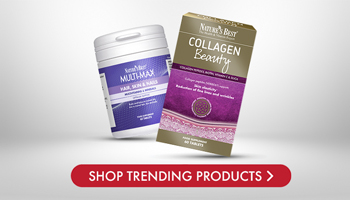
There are many ways to nourish your skin: getting enough beauty sleep, following a carefully curated skincare routine, and stressing less. But there’s one thing experts unequivocally agree on: what you eat directly impacts your complexion. Want an enviable glow? Look no further than the food on your plate.
Here are some of the best skin-friendly nutrients to cram into your diet.
Anthocyanidins
Members of the flavonoid family, some call anthocyanidins the ‘Big Daddy’ of the antioxidant world. These highly active plant compounds give berries their dazzling blue, purple, and red hues. Their role in skin health is widely documented – and tremendously promising.
 Antioxidants are powerful molecules that help fight free radical damage in the body. Air pollution, cigarette smoke, alcohol, UV exposure, and toxins can lead to excessive free radical production, which is known to damage the skin.
Antioxidants are powerful molecules that help fight free radical damage in the body. Air pollution, cigarette smoke, alcohol, UV exposure, and toxins can lead to excessive free radical production, which is known to damage the skin.
A regular dietary intake of antioxidants, like anthocyanidins, may support the skin’s renewal process and collagen formation.
Eat them: Blueberries, or try Colladeen Visage (which contains more anthocyanidins than any supplement!)
Green tea
The properties of green tea have long been used for skin health. As a drink, it’s crammed with skin-loving antioxidants, which is why you often find green tea extract in so many skincare products.
Drink it: One to two cups daily.
Vitamin A
Vitamin A plays a hugely important role in maintaining overall skin health. And that’s why retinol (a topical vitamin A) is so widely hyped by skincare experts.
Eat it: Sweet potato
Vitamin C
Arguably the best-known antioxidant in the skincare arena, vitamin C contributes to normal collagen formation in the skin. And that’s why healthy skin needs high concentrations of vitamin C.
Eat it: Spinach
Biotin
Biotin doesn’t only support the metabolism of glucose, fats, and proteins; it also contributes to normal skin. Many experts in the skincare world tout biotin as the secret to a radiant complexion (not to mention stronger nails and hair!).
Eat it: Eggs
Vitamin E
Vitamin E is an old hand at the beauty game – and no wonder. This little guy works hard to keep the skin radiant by protecting cells from oxidative stress.
Eat it: Sunflower seeds
Zinc
Zinc supports your complexion in two ways: firstly, it works hard to maintain normal skin; secondly, it contributes to the protection of cells from oxidative stress (aka the loss of collagen and elastin fibres).
Eat it: Pumpkin seeds
Astaxanthin
Evidence suggests astaxanthin is somewhat unrivalled in its antioxidant properties, surpassing other well-known skincare superfoods, like vitamin E.1 Perhaps most notably, astaxanthin is said to be 6,000 times stronger than vitamin C!2
Eat it: Wild salmon
Selenium
Another important antioxidant, selenium protects cells from oxidative stress, which is known to play a role in skin ageing. Take that, free radical damage.
Eat it: Brazil nuts
Sea buckthorn berry oil
The berries found in the sea buckthorn plant aren’t only tremendously rich in skin-loving antioxidants, but also in the omega-7 essential fatty acid, palmitoleic acid, which works hard to keep the mucous membranes in the skin healthy.
Find it: Nutritional supplements
CoQ10
Widely believed to function as an antioxidant, CoQ10 is another important nutrient for skin health. Since the body’s ability to make CoQ10 declines with age, ensuring a plentiful intake is essential.
Eat it: Mackerel
FREE expert nutrition advice
Our dedicated Nutrition Advice department is a major reason for our success. Our Nutrition Advisors have a wealth of experience between them. They talk to thousands of customers every year, helping them make the right choice from our extensive product offerings. No matter how small your query, they’re happy to help. So, if you’re still unsure what to select, please do reach out via email, phone, or Live Chat.
Call: 01892 552 175
Email: nutrition@naturesbest.co.uk
Write: Nature’s Best Ltd. Century Place, Tunbridge Wells, Kent, TN2 3BE
Want to find out more?
Read more of our resources on ageing and related content here.
References:
-
Naguib YM., Antioxidant activities of astaxanthin and related carotenoids. J Agric Food Chem. 2000;48(4): 1150-4.
-
Ambati RR. et al.,, Astaxanthin: sources, extraction, stability, biological activities and its commercial applications--a review. Mar Drugs. 2014;12(1): 128-152.
You Might Also Like

Olivia
Olivia Salter has always been an avid health nut. After graduating from the University of Bristol, she began working for a nutritional consultancy where she discovered her passion for all things wellness-related. There, she executed much of the company’s content marketing strategy and found her niche in health writing, publishing articles in Women’s Health, Mind Body Green, Thrive and Psychologies.
View More



